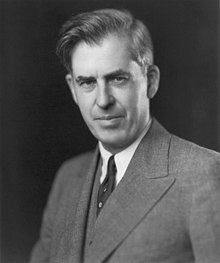
Back هنري أغارد ولاس Arabic Henry A. Wallace AST Henri Volles Azerbaijani هنری والاس AZB Генры Эгард Уолес Byelorussian Хенри Уолъс Bulgarian Henry Agard Wallace Catalan Henry A. Wallace CDO Henry A. Wallace Czech Henry A. Wallace Danish
Henry A. Wallace | |
|---|---|
 | |
| 33rd Vice President of the United States | |
| In office January 20, 1941 – January 20, 1945 | |
| President | Franklin D. Roosevelt |
| Preceded by | John Nance Garner |
| Succeeded by | Harry S. Truman |
| 10th United States Secretary of Commerce | |
| In office March 2, 1945 – September 20, 1946 | |
| President |
|
| Preceded by | Jesse H. Jones |
| Succeeded by | W. Averell Harriman |
| Chair of the Supply Priorities and Allocations Board | |
| In office August 28, 1941 – January 16, 1942 | |
| President | Franklin D. Roosevelt |
| Preceded by | Office established |
| Succeeded by | Office abolished |
| Chair of the Board of Economic Warfare | |
| In office July 2, 1940 – July 15, 1943 | |
| President | Franklin D. Roosevelt |
| Preceded by | Office established |
| Succeeded by | Office abolished |
| 11th United States Secretary of Agriculture | |
| In office March 4, 1933 – September 4, 1940 | |
| President | Franklin D. Roosevelt |
| Preceded by | Arthur M. Hyde |
| Succeeded by | Claude R. Wickard |
| Personal details | |
| Born | Henry Agard Wallace October 7, 1888 Orient, Iowa, U.S. |
| Died | November 18, 1965 (aged 77) Danbury, Connecticut, U.S. |
| Resting place | Glendale Cemetery |
| Political party |
|
| Other political affiliations | Progressive "Bull Moose" (1912) |
| Spouse | |
| Children | 3 |
| Parent |
|
| Education | Iowa State University (BS) |
| Signature | |
Henry Agard Wallace (October 7, 1888 – November 18, 1965) was an American politician, journalist, farmer, and businessman who served as the 33rd vice president of the United States, from 1941 to 1945, under President Franklin D. Roosevelt. He served as the 11th U.S. secretary of agriculture and the 10th U.S. secretary of commerce. He was the nominee of the new Progressive Party in the 1948 presidential election.
The oldest son of Henry C. Wallace, who served as U.S. Secretary of Agriculture from 1921 to 1924, Henry A. Wallace was born in rural Iowa in 1888. After graduating from Iowa State University in 1910, he worked as a writer and editor for his family's farm journal, Wallaces' Farmer. He also founded the Hi-Bred Corn Company, a hybrid corn company that became extremely successful. Wallace displayed intellectual curiosity about a wide array of subjects, including statistics and economics, and explored various religious and spiritual movements, including Theosophy. After his father's death in 1924, Wallace drifted away from the Republican Party; he supported Democratic nominee Franklin D. Roosevelt in the 1932 presidential election.
Wallace served as Secretary of Agriculture under Roosevelt from 1933 to 1940. He strongly supported the New Deal and presided over a major shift in federal agricultural policy, implementing measures designed to curtail agricultural surpluses and to ameliorate rural poverty. Roosevelt overcame strong opposition from conservative leaders in the Democratic Party and had Wallace nominated for vice president at the 1940 Democratic National Convention. The Roosevelt-Wallace ticket won the 1940 presidential election. At the 1944 Democratic National Convention, conservative party leaders defeated Wallace's bid for renomination, placing Missouri Senator Harry S. Truman on the Democratic ticket instead. In early 1945, Roosevelt appointed Wallace as Secretary of Commerce.
Roosevelt died in April 1945 and Truman succeeded him as president. Wallace continued to serve as Secretary of Commerce until September 1946, when he was fired by Truman for delivering a speech urging conciliatory policies toward the Soviet Union.[1] Wallace and his supporters then established the nationwide Progressive Party and launched a third-party campaign for president. The Progressive platform called for conciliatory policies toward the USSR, desegregation of public schools, racial and gender equality, a national health-insurance program, and other left-wing policies. Accusations of communist influence followed, and Wallace's association with controversial Theosophist figure Nicholas Roerich undermined his campaign; he received just 2.4% of the popular vote. Wallace broke with the Progressive Party in 1950 over the Korean War, and in a 1952 article he called the Soviet Union "utterly evil". Turning his attention back to agricultural innovation, he became a highly successful businessman. He specialized in developing and marketing hybrid seed corn and improved chickens before his death in 1965 of amyotrophic lateral sclerosis (ALS).
- ^ "Henry Agard Wallace, 33rd Vice President (1941–1945)". Senate.gov. Senate Historical Office. May 5, 2017. Archived from the original on March 25, 2019. Retrieved March 25, 2019.
© MMXXIII Rich X Search. We shall prevail. All rights reserved. Rich X Search